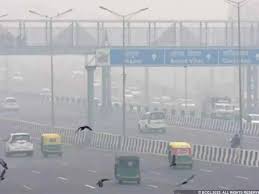
As Delhi-NCR continues to battle its worst air quality in years, the Delhi government has taken a significant step to protect its workforce from the hazardous pollution levels. Starting today, 50% of the Delhi government employees will be working from home as part of a series of measures aimed at addressing the “severe” air quality in the region.
The Air Quality Index (AQI) in many parts of Delhi-NCR has surpassed the 450 mark, which is categorized as “severe,” triggering a response under Stage IV of the Graded Response Action Plan (GRAP). This is the most stringent level of action, designed to mitigate the harmful effects of the ongoing air pollution crisis.
In a statement, Delhi Environment Minister Gopal Rai confirmed that the Delhi government’s offices will operate with reduced staff. “To reduce pollution, the Delhi government has decided to implement a work-from-home policy for 50% of its employees. A meeting will be held at 1 pm today in the Secretariat to ensure smooth implementation,” said Rai.
This decision comes as Delhi grapples with a worsening pollution crisis, which has led to several precautionary measures. Recently, the Delhi government also implemented staggered office timings for its own staff and for the Municipal Corporation of Delhi (MCD). Additionally, a ban has been imposed on the operation of BS-IV and older diesel medium and heavy goods vehicles (MGVs and HGVs) registered in the city, with exemptions only for essential services. Similar bans are also in effect for BS-III petrol vehicles.
Schools for Classes 10 to 12 have been temporarily closed to protect students from exposure to the toxic air, and other measures like increased use of air purifiers and the encouragement of mask-wearing are being pushed as immediate steps to protect public health.
In a bid to explore longer-term solutions, the Delhi government had previously collaborated with IIT Kanpur to investigate cloud seeding as a possible emergency measure. Preparations for this year’s cloud seeding operations began in August, but a final meeting regarding its implementation has yet to take place.
With pollution levels continuing to escalate, authorities are urging citizens to limit outdoor activities and take all necessary precautions to reduce exposure to harmful pollutants, which have been linked to respiratory problems, cardiovascular diseases, and other serious health issues. The Delhi government has emphasized that the ongoing measures are crucial to mitigating the risks of long-term health complications caused by this unprecedented air quality crisis.
As the city waits for further decisions from the government, experts remain concerned about the worsening state of air pollution and its impact on public health, urging for more comprehensive and immediate action to tackle the crisis.
Sources By Agencies

